Accompaniment College of Arts and Sciences in Action

 From the Office of the Dean: Annmarie Caño, Ph.D.
From the Office of the Dean: Annmarie Caño, Ph.D.


 From the Office of the Dean: Annmarie Caño, Ph.D.
From the Office of the Dean: Annmarie Caño, Ph.D.
It’s an exciting time in the College of Arts and Sciences (CAS) at Gonzaga University!
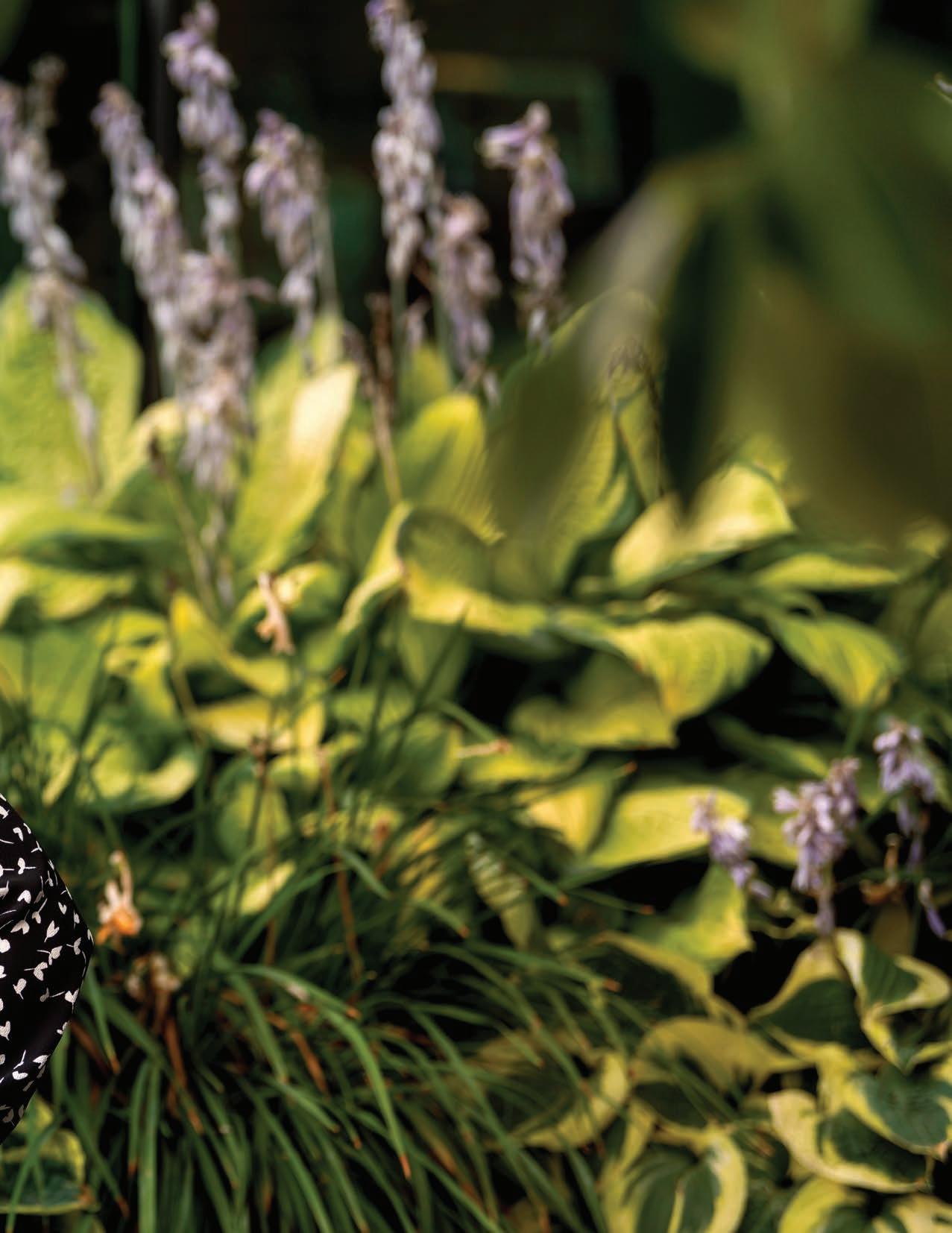
In my third year as Dean, I continue to be inspired by how faculty and staff across the College’s 22 departments accompany our students. From teaching classes in the University core, 33 majors and 50 minors, and prerequisites for professional programs in the professional schools, almost every Gonzaga undergraduate experiences our awesome faculty and staff. While we invest our time, energy and expertise to ensure that students have successful outcomes (see First Destination Report), we also recognize that Jesuit education at Gonzaga is not just about where students land.
The Jesuits set high standards for our work with their Universal Apostolic Preferences for all Jesuit institutions. The four preferences guide our work in whatever Jesuit apostolate we find ourselves. They include walking with the excluded, teaching the Spiritual Exercises of St. Ignatius of Loyola, caring for our common home, and the theme for this year’s e-newsletter, Journeying with Youth. Of course, there are many ways to journey with youth in Jesuit education. In the College of Arts and Sciences, we are especially dedicated to accompaniment through the breadth and depth across disciplines, including visual and performing arts; humanities; mathematics, the physical and life sciences; and social sciences. Almost every Gonzaga undergraduate passes through the classrooms of College instructors. Beyond the classroom, through advising and mentoring, co-curricular clubs and the lab and studio, College of Arts and Sciences faculty and staff teach and guide students to live lives of service for others. Here, students learn
skills that will serve them well in work and life. They become more engaged citizens who make decisions rooted in truth, beauty and goodness.
Working with department chairs and other College staff, we cultivate learning environments that embrace the journey. That means we:
• Hire, retain and develop excellent faculty and staff who can support students and help them grow as people;
• Generate research and creative work that is meaningful and has a community impact; and
• Engage students across the university, through the Core Curriculum even if they are not majoring in College of Arts and Sciences (CAS).
In the following pages, you will meet just some of the amazing faculty and staff who support students on their journeys. We are focusing on the paths outside the traditional classroom experience, where students apply their skills in communication, critical thinking, creative problem-solving, and grace under pressure to educate, inform and inspire others. You will meet faculty who guide students in our successful Model UN program, and others who create space for students to thrive in STEM, and more. You will also meet current students and alumni who are applying what they learn to make a better and more just, vibrant world.
With gratitude,
Annmarie
Ifwe aren’t looking for them, life-changing opportunities to accompany our students can wildly alter our most basic assumptions about our own path. This old-as-time story could be written for political science professor and chair Stacy Taninchev and Gonzaga’s Model UN.
Arriving at GU as an assistant professor with her eye on intergovernmental organizations and conducting statistical analyses, she was approached by the
department chair and student Michael Imasua (’11) to become the project’s faculty advisor. Michael championed the effort with his knowledge of the Model UN structure from another college and insisted Taninchev attend the next meeting. What she encountered – academic rigor, public speaking, reasoning and research – convinced her immediately. At that moment, she knew, “I can’t not be involved in this,” and the rest is history.

After Michael and others transitioned the program from student life to an academic program and a course housed under the political science department, Taninchev established a cadence for each semester. In the fall, students dive deep into the United Nations’ policies, history and governing structure. Using this knowledge, they then learn their assigned country’s various topical positions, history, and often, culture. After being assigned to a committee, which could pertain to human rights, gender or peace-building, students work into the winter break, crafting position papers and preparing to defend their country. What differentiates Model UN (MUN) from simply learning in the classroom or reading a book is that students must communicate their knowledge in the MUN community, often with people they’ve never met. This experiential learning forges their knowledge almost by fire. Students must be agile, leveraging their hard-won knowledge of a place and its people on the spot and not through their own personal mindset but that of Greece or Afghanistan, depending on their assignment that year. Because students commit to a country’s perspective, they inevitably confront stances that go against their personal views of the world. It is not uncommon for students to represent countries that are non-accepting of LGBTQ rights or are a state under an authoritarian government. Students must set aside their own values and put themselves in the mindset of a country whose position they may disagree with. Taninchev notes students’ most significant growth comes from the MUN’s higher aim of solving global problems, working with others from across the globe, and pushing themselves to move through discomfort to a clearly articulated position contrary to their own.
While Taninchev stresses that MUN is less a space for competition and awards, she can’t help but beam when discussing its successes – from awards at Northwest Model United Nations conference in Portland to its alums. Last February at the event, students took home the Outstanding Delegation Award, Outstanding Position Paper Award and Distinguished Delegate Award.
And alums continue to make Taninchev proud. She maintains relationships with many of them, rattling off their latest positions, noting that their work goes beyond titles to real-world impacts. Paúl Quiñonez Figueroa (’15), for instance, is currently the deputy state director for Senator Maria Cantwell. Caitlin Pallai (’14), the public information officer at the City of Fargo. But what about the student who started it all? After taking on a role at the UN Office of the Secretary General’s Envoy on Youth, Michael Imasua is now a senior policy analyst in the New York Governor’s Office of Storm Recovery.
Who better to lead the Gonzaga Model UN than a political science professor who takes the University’s mission to heart, leading by example by bridging the academic with the hands-on, the theory with the practice than Taninchev?
When asked what advice she would give students overwhelmed with today’s problems, Taninchev draws from her experiences, urging students to find the common thread in their passions. While acknowledging that no single issue exists in a vacuum, Taninchev says it’s essential to stay the course. Over the years, that focus for her has morphed and included intergovernmental organizations, the United Nations, climate change and racial justice. Through it all, she uses the UN’s Sustainable Development Goal 16 as her guiding star, promoting peace, justice and strong institutions.
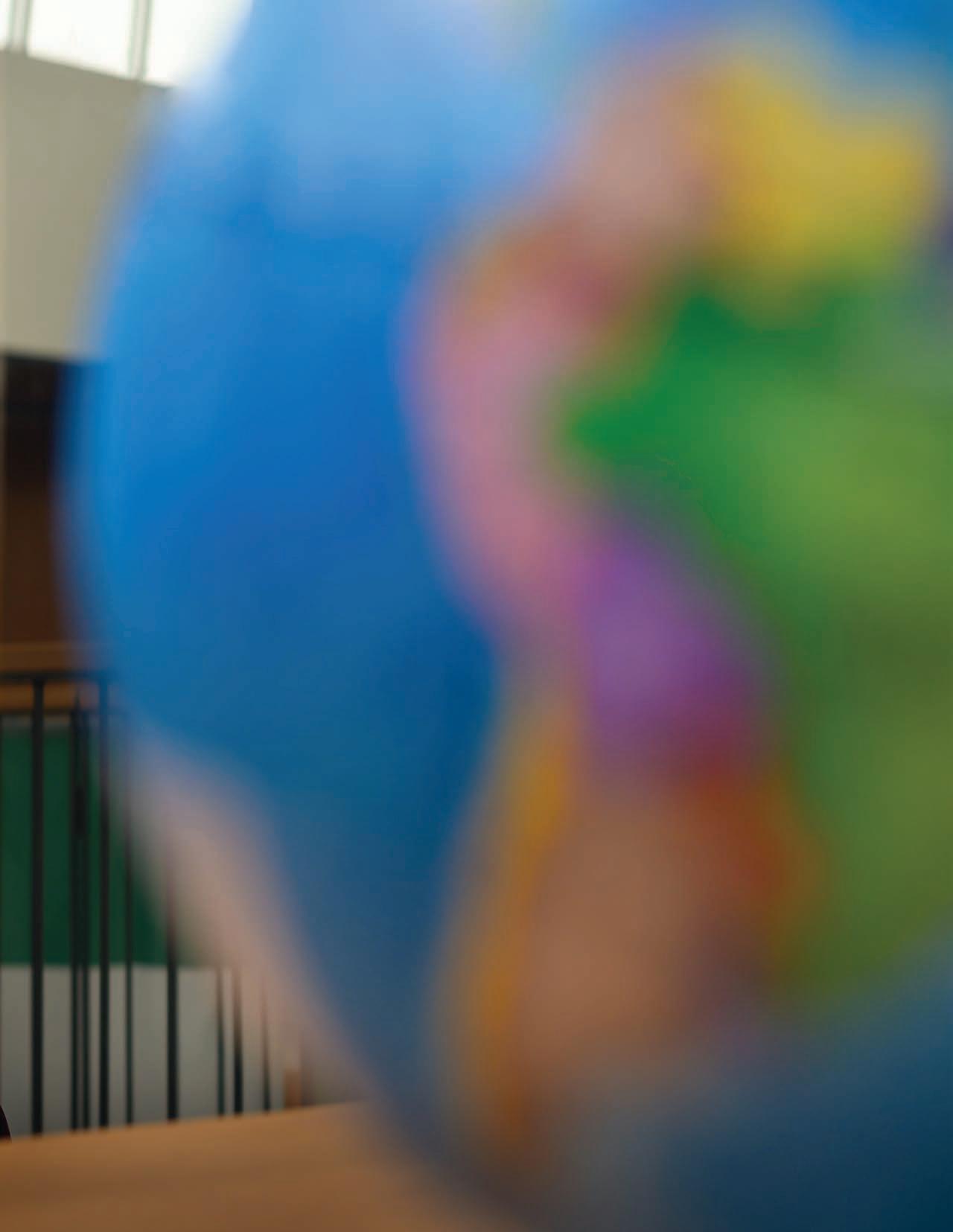
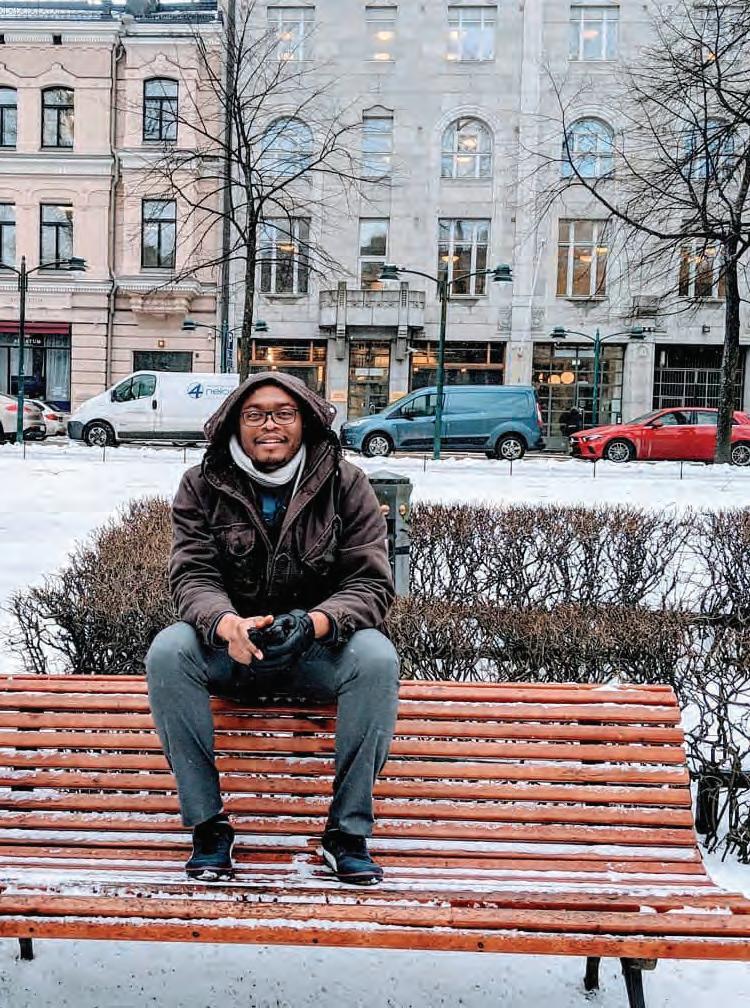
Q: What inspired you to bring Model UN to Gonzaga?
A: Within weeks of arriving at Gonzaga as a transfer student, I felt something lacking in my academic journey. Having served as a head delegate for the Model UN at Miami Dade College, I needed a similar platform where students of all disciplines could express themselves in the world of global discourse, simulate solutions to current global issues, and cultivate skills in diplomacy, negotiations, research, writing, public speaking and critical thinking. Of course, there were programs like Mock Trial, but I was determined to start a Model UN program. I also knew I did not want to be constrained by the fluctuating rules of university clubs, so I took on the challenge of seeking buy-in from the University leadership to establish an academic program that can be housed within existing faculties and funded in whole or part by the University. Of course, there is also something rewarding about all these approaches taken, which is about building something from the ground up. I embarked on a challenge and with it came the fulfillment of a reputable Model UN program that is open to all students.
Ariana Chin (’23), who has works as she graduates this spring – honors, political science, international studies, criminology) and a minor in psychology earned distinctions while studying abroad at Queen Mary University of London and participating in its Model UN (MUN). Acting as Gonzaga MUN’s secretary general, Chin won Best Position Paper representing Norway in the security council at Oxford International Model UN. She says: “Participating in MUN for 8 years has taught me so much about the world around me as I conduct research and represent different countries with regard to various issues each week. I continue to learn what it means to be a global citizen; improve my researching, writing, diplomacy, and public speaking skills; expand my knowledge on how the UN functions; and understand the UN’s significance within society. MUN has encouraged me to keep an open mind, pushing me out of my comfort zone in different and safe ways while providing me with the opportunity to meet lifelong friends from all over the world.”
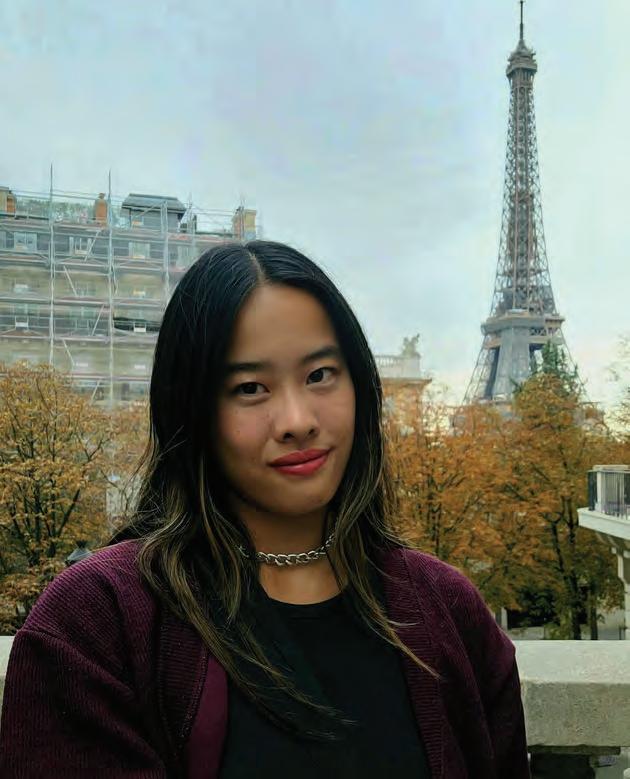
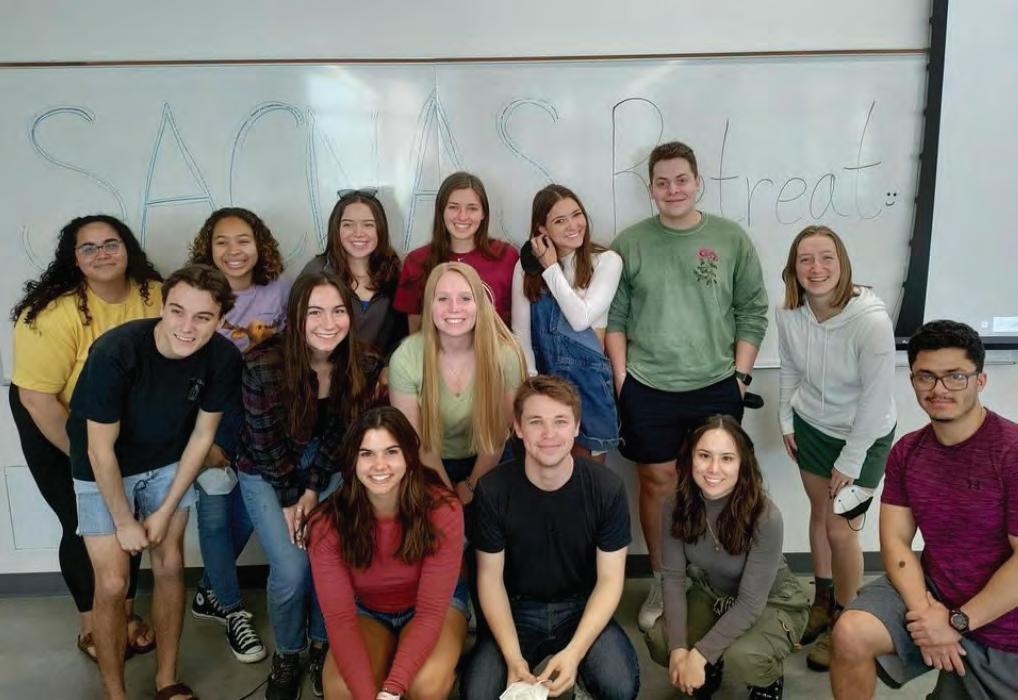
Introducing SACNAS
The Society for the Advancement of Chicanos/Hispanics and Native Americans in Science is also open to all underrepresented groups and their allies. This studentled chapter came to Gonzaga in 2021 with the assistance of faculty advisor Laura Diaz-Martinez and two former faculty members.
Emiliano Soto-Romero (’23 biology), current president of the Gonzaga SACNAS chapter, presented at the National Diversity in STEM (NDiSTEM) conference in San Juan, Puerto Rico. He conducted his research in DiazMartinez’s lab. From Emiliano: “I came into this conference with a much different plan after graduation. Before the conference, I was set on finding a job in a lab or in industry and working for a couple years before applying to graduate or medical school but now I plan to do a post-bac program to prepare for the next step in my education, whatever that may be.”
(Society for Industrial & Applied Mathematics)
Created in 2020 and facilitated by math faculty Joe Stover, the Gonzaga SIAM student branch invites special speakers and receives funding for travel to SIAM events and conferences. Ben Lombardi (‘23), chapter president, attended the SIAM Pacific Northwest Section Annual Meeting last April and won a 2nd place poster award. His research, funded in part by a McDonald Work Award, “Stability of Explicit Free Parameter Multistep Methods for SecondOrder ODEs.” Michelle Ghrist served as his faculty advisor for the project.
Alumna Annabella Gelmetti (’22) is making a big splash in Nashville after graduating summa cum laude with a Bachelor of Arts in music composition and a conducting minor. Gelmetti has toured her original composition and choreographed work, “The Fearies throughout Oregon,” with its debut at Gonzaga. She continues to compose work and has released a new video, “Lean.” Catch up with Annabella and her original creations online.
Students Shyh Saenz (‘23 communication studies) and Anasofia Gutierrez (’22 psychology) participated in a historic encounter with Pope Francis, along with 130 students from 21 countries and 58 universities. Saenz and Gutierrez used this first-of-its-kind event to focus on immigration issues in the United States and how the church can help migrant communities.
Shyh also joined the Congressional Hispanic Caucaus Initiative as an intern for Representative Ruben Gallego this summer. She hopes to use her growing experience to improve and diversify communications.
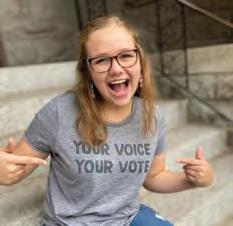
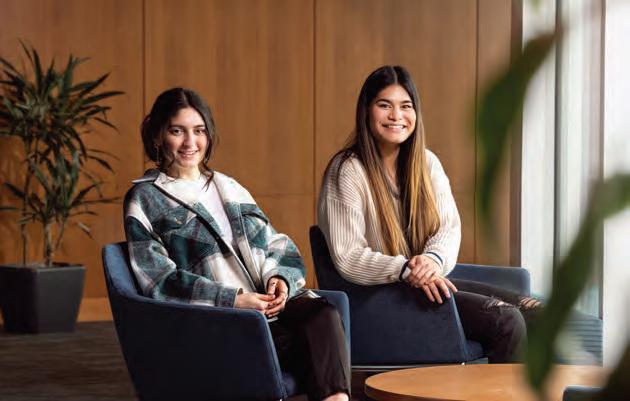
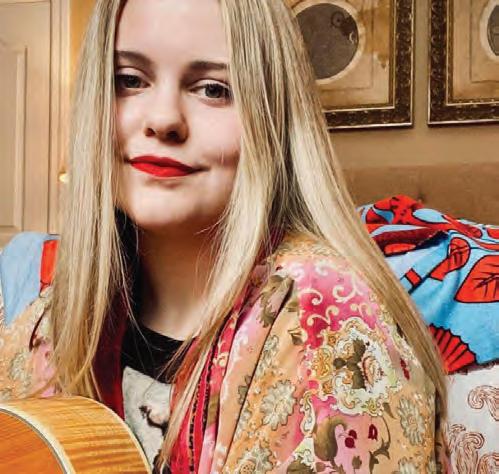
Mae Cramer (’24), political science major and gender studies minor, was one of 100 students selected out of 1,800 applicants for the Voyager Scholarship from the Obama Foundation. The award offers financial aid support to students like Cramer who are passionate about public service. Cramer hopes to use her experience with the scholarship and its Fall summit to focus on women and immigrant’s rights.
Students took part in this summer’s University of Washington-Gonzaga University Regional Health Partnership’s undergraduate Summer Research Program in Seattle, which culminated in each student giving fiveminute presentations on their experimental approach and findings. Students articulated what they’d learned and answered questions from an audience of their mentors, peers, friends and family. They then presented their work alongside first-year medical students during a poster session. Thanks to the support of biology professor Bill Ettinger, students learned the value of academic excellence through research. Participants included Ashley Chon, Emma Winter, Rhys Heenan, Sarah Maeda, Emma Horton, Alyssa Bienfang and Emma Spiegal
What makes a good ancestor? With or without descendants of our own, being a good ancestor means caring for the people and places beyond our immediate family or workplace – accompanying youth, being a good steward of the land, resources and people – someone who brings their life’s work to bear through servant leadership.
Cindy Runger embodies these characteristics as an alumna and regional leader. Through an undergrad degree in political science, a law degree, experience as an attorney for the Washington State Senate and a regent for Gonzaga University, it’s safe to say Cindy believes in setting an example for others and providing the environment for faculty and future students to thrive. Knowing her capacity for good ancestor-ship and with gratitude for her financial support of the Runger/Dolliver Faculty Excellence Award for the College of Arts and Sciences, we sought to understand her better. The following has been edited for length and clarity. You’ve provided a lifetime of servant leadership. Where have you drawn your leadership strengths?

I have been fortunate to have great leadership influences throughout my life. As a high school sophomore, my counselor, Mrs. Larson, selected me to represent the school at the Hugh O’Brien Leadership State Conference.
The conference taught us about teamwork, advocacy and philanthropy, but what truly made an impact and set me on my path to servant leadership was Mrs. Larson. I remember her blue eyes twinkling behind her enormous glasses when she delivered the news. At that time, I was eager to impact the world, yet uncertain about what to do with that energy. She saw me. She believed in me. She helped bring forth something in me that was waiting to burst.
As a political science major, Gonzaga was a meaningful place to think big thoughts and ponder my place in the world. I received tremendous encouragement from the faculty and staff, mainly from my political science professors. Also, by engaging students in my role as GSBA president, I understood what was important to students. Together we amplified our voices and highlighted issues that directly impacted us, like rising tuition and fees. We explored our role in the world, like questioning our financial investments in companies that did business with South Africa under apartheid.
And lastly, I must give a shout-out to my parents. I was born in Vietnam during the war and am blessed to have lived the dream immigrant success story.
You support the Faculty Excellence Fund; why do you think it’s essential for Gonzaga to hire, retain and award quality faculty members?
The work that the faculty do is important and impactful. They have the tremendous daily ability to open new worlds to eager students. Everyone should have someone as engaged and committed as Mrs. Larson.
The ultimate long-term impact my husband and I are hoping for is to help support a diverse group of highachieving faculty who will lead students to success and become servant leaders.
We are especially drawn to support faculty in the BIPOC community, as another way to demonstrate that GU fully supports and celebrates them and their work. What advice would you give anyone who enters the classroom or academy as the “first”? (First gen, first woman of color, person of color)
Being a woman of color in leadership in law and finance, I know a lot about firsts.
As the first, I had to work harder at convincing others of my status. When I was a young lawyer attending legal conferences, other attorneys often assumed I was another lawyer’s spouse. When I was an advisor in wealth management, people often assumed that I was the assistant. I had to prove time and time again that I was more competent, qualified and caring than anyone around me.
It’s not always easy. And it’s sometimes lonely. I overcame my solitude by connecting with people and creating a support system. Allies come in all genders, colors and persuasions. Even though most of my allies could glide through the world, never having experienced the racism, sexism and microaggressions I endured, I created strong bonds with exceptional people who became great champions and mentors.
I also had to advocate for myself because I knew my value. Maya Angelou comes to mind when she says, “Each time a woman stands up for herself, without knowing it possibly, without claiming it, she stands up for all women.”
I sought ways to match my skills and interests with the right opportunities. In addition to being a team player and doing the “office housework,” I positioned myself to take on the more high-profile “glamour work,” which got me noticed.
Your support of the Dean’s Excellence Fund empowers critical programs in the College of Arts and Sciences.
» Give now gonzaga.edu/CASdean
DEAN Annmarie Caño, Ph.D. ASSOCIATE DEANS Jonathan Rossing, Ph.D. Stacy Taninchev, Ph.D. Molly Kretchmar-Hendricks, Ph.D. ADVISORY BOARD CHAIR Liz MorrisThat strategy sometimes earned me the label of being too ambitious. I have worked hard to gain knowledge, experience and insight. I know I have much to contribute, so I strive to be courageous and to teach by being. WRITER
McCormick Martin Vanskike ART Wilson2,351 STUDENTS WITH MAJORS IN CAS comprising approximately 40% of all undergraduate majors at GU
1,231 STUDENTS WITH MINORS
33 majors
TOP MAJORS (BY ENROLLMENT)
» PSYCHOLOGY
» BIOLOGY
» POLITICAL SCIENCE
$6.1 M DONATIONS RECEIVED
$1,315,053 Grant funding in fiscal year 2022
255
9:1 STUDENT TO FACULTY RATIO
196 TENURE TRACK, TENURED, AND LECTURER FACULTY
96.9% SUCCESS RATE IN POST-GRADUATE PLACEMENT